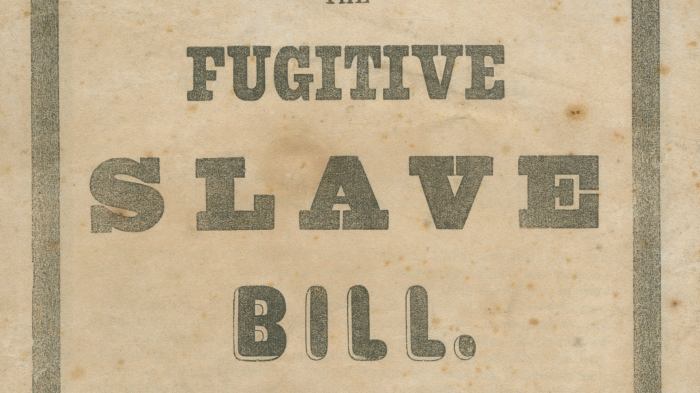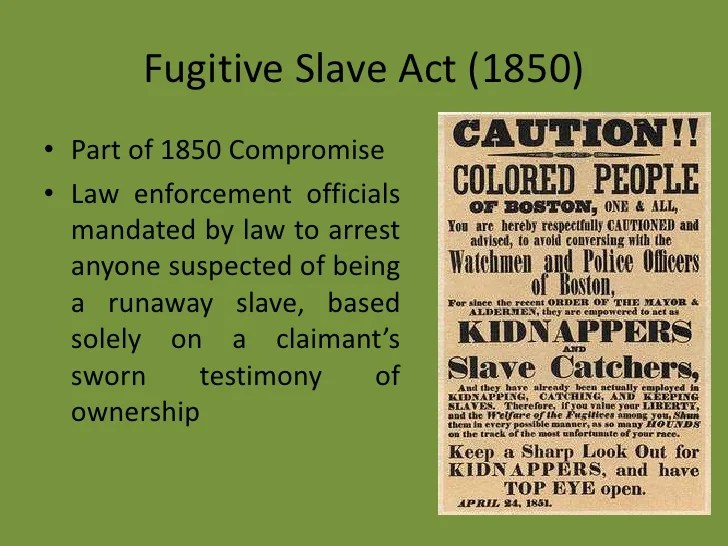Fugitive slave law apush definition – The Fugitive Slave Law, enacted in 1850, stands as a pivotal piece of legislation in American history, shaping the nation’s political landscape and exacerbating tensions between the North and South. This law, designed to enforce the return of escaped slaves to their owners, had far-reaching consequences for both fugitive slaves and the abolitionist movement.
The Fugitive Slave Law was rooted in the constitutional provision that recognized slavery as a legal institution. However, its implementation sparked widespread resistance and fueled the growing abolitionist sentiment.
Definition of Fugitive Slave Law
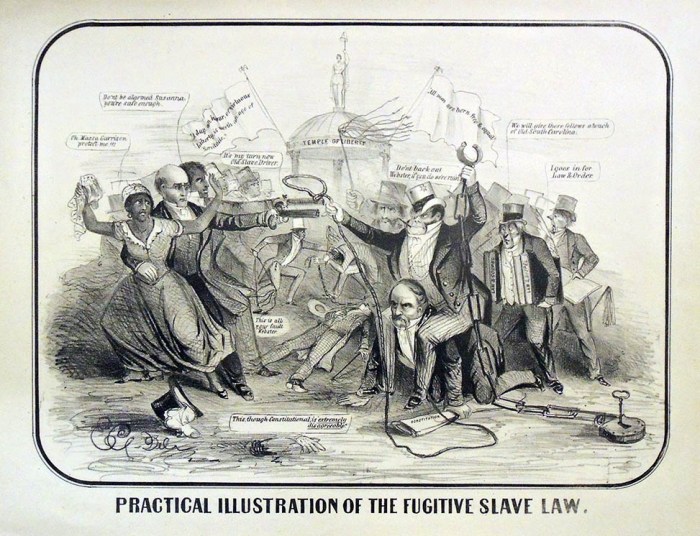
The Fugitive Slave Law of 1850 was a controversial law passed by the United States Congress that allowed for the capture and return of escaped slaves to their owners, even in states where slavery had been abolished.
The law was passed as part of the Compromise of 1850, which was an attempt to resolve the issue of slavery in the territories acquired by the United States after the Mexican-American War. The Fugitive Slave Law was designed to appease Southern slaveholders who were concerned that the expansion of free territory would lead to the loss of their property.
Legal Basis and Historical Context
The Fugitive Slave Law was based on the Fugitive Slave Clause of the United States Constitution, which states that “No Person held to Service or Labour in one State, under the Laws thereof, escaping into another, shall, in Consequence of any Law or Regulation therein, be discharged from such Service or Labour, but shall be delivered up on Claim of the Party to whom such Service or Labour may be due.”
This clause had been included in the Constitution as a compromise between Northern and Southern states during the Constitutional Convention in 1787.
The Fugitive Slave Law of 1850 expanded on the Fugitive Slave Clause by providing federal commissioners with the authority to issue warrants for the arrest of escaped slaves. It also imposed fines and penalties on anyone who helped an escaped slave or interfered with their capture.
The Fugitive Slave Law was a highly controversial law that was widely criticized by abolitionists and free Black people. It was also a major factor in the growing tensions between the North and South that eventually led to the Civil War.
Impact on Fugitive Slaves
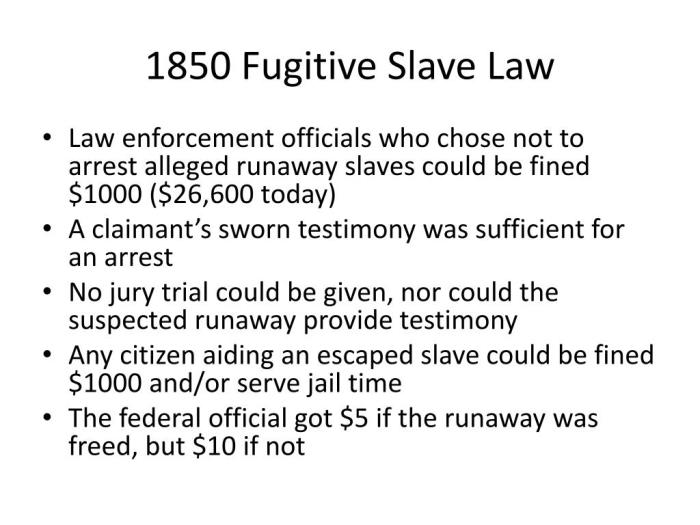
The Fugitive Slave Law had a profound and devastating impact on the lives of fugitive slaves. It made it extremely difficult for them to escape to freedom and subjected them to constant fear of being captured and returned to slavery.
Methods Used to Capture and Return Fugitive Slaves
Slave catchers used various methods to capture fugitive slaves, including:
- Informants and informers:Slave catchers often relied on informants within the slave community to provide information about the whereabouts of fugitive slaves.
- Bloodhounds:Bloodhounds were used to track the scent of fugitive slaves and follow them to their hiding places.
- Patrolling:Slave catchers patrolled the countryside, looking for fugitive slaves and questioning anyone they suspected of harboring them.
- Roadblocks:Slave catchers set up roadblocks to stop travelers and check for fugitive slaves.
- Kidnapping:In some cases, slave catchers resorted to kidnapping free Black people and selling them into slavery, mistaking them for fugitive slaves.
Resistance to the Law
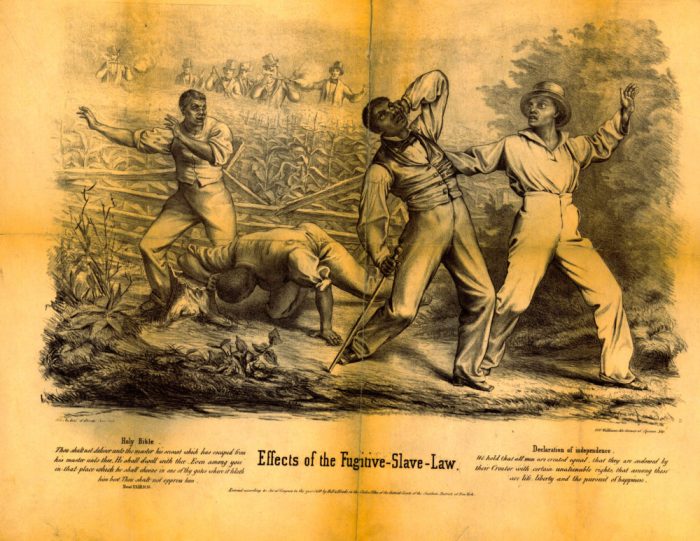
The Fugitive Slave Law faced significant resistance from abolitionists and fugitive slaves alike. Abolitionists actively assisted slaves in escaping to freedom through the Underground Railroad, a network of secret routes and safe houses. They provided shelter, food, and transportation to fugitive slaves, helping them evade capture and reach free states or Canada.
Examples of Resistance
Fugitive slaves also resisted capture and enslavement. Some fled to remote areas or disguised themselves to avoid detection. Others fought back against slave catchers, using violence or legal means to assert their freedom. One notable example is the case of Anthony Burns, a fugitive slave who was captured in Boston in 1854. Abolitionists organized mass protests and raised funds to pay for his freedom, eventually securing his release and return to Canada.
Effectiveness of Resistance
While the Fugitive Slave Law aimed to suppress resistance, it ultimately failed to prevent the escape of fugitive slaves. The Underground Railroad continued to operate, and thousands of slaves successfully escaped to freedom. The resistance efforts of abolitionists and fugitive slaves raised awareness of the evils of slavery and contributed to the growing abolitionist movement, which played a crucial role in the eventual abolition of slavery in the United States.
Political and Social Impact
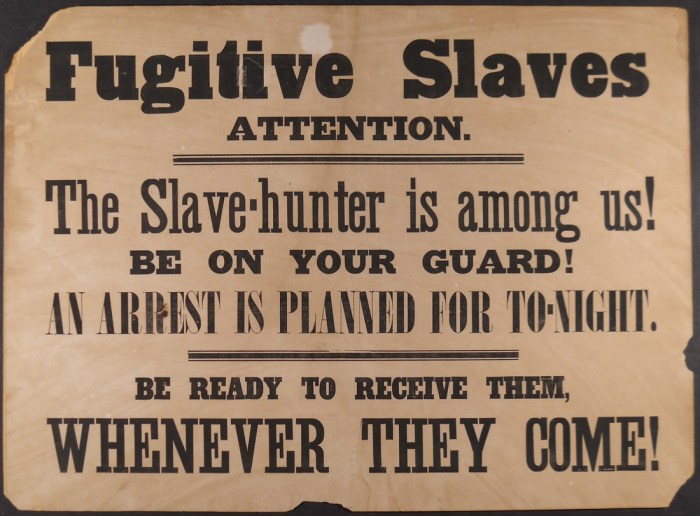
The Fugitive Slave Law of 1850 had a profound political and social impact on the United States. It became a major source of division and debate, exacerbating tensions between the North and South and contributing to the growing crisis that led to the Civil War.
Political Divisions
The Fugitive Slave Law sparked intense political debates in both the North and South. In the North, abolitionists and anti-slavery activists vehemently opposed the law, viewing it as a violation of the rights of free Black people and a betrayal of the principles of liberty and equality.
They argued that the law required Northern citizens to assist in the capture and return of fugitive slaves, even if they believed slavery to be morally wrong. This created a moral dilemma for many Northerners, who felt torn between their duty to uphold the law and their conscience.
In the South, slaveholders and their supporters defended the Fugitive Slave Law as necessary for maintaining the institution of slavery. They argued that without such a law, fugitive slaves would easily escape to the North, undermining the economic and social order of the South.
The law’s passage strengthened the political power of the slaveholding class and further entrenched the institution of slavery in the Southern states.
Impact on North-South Tensions, Fugitive slave law apush definition
The Fugitive Slave Law had a significant impact on the growing tensions between the North and South. The law’s enforcement in the North led to numerous incidents of violence and resistance, as anti-slavery activists and abolitionists sought to protect fugitive slaves from capture.
These incidents further inflamed tensions between the two regions and contributed to the growing polarization of American society.
The Fugitive Slave Law also became a major issue in the presidential election of 1860, with both the Republican and Democratic parties taking strong stances on the issue. The election of Abraham Lincoln, who opposed the Fugitive Slave Law, further escalated tensions between the North and South and ultimately led to the outbreak of the Civil War.
Detailed FAQs: Fugitive Slave Law Apush Definition
What was the purpose of the Fugitive Slave Law?
The Fugitive Slave Law was intended to facilitate the recapture and return of escaped slaves to their owners.
How did the Fugitive Slave Law affect fugitive slaves?
The law made it extremely difficult for fugitive slaves to escape to freedom, as they faced the constant threat of being captured and returned to their owners.
What were the methods used to capture fugitive slaves?
Slave catchers, often working with local law enforcement, employed various methods to apprehend fugitive slaves, including tracking them down, using informants, and setting up roadblocks.
